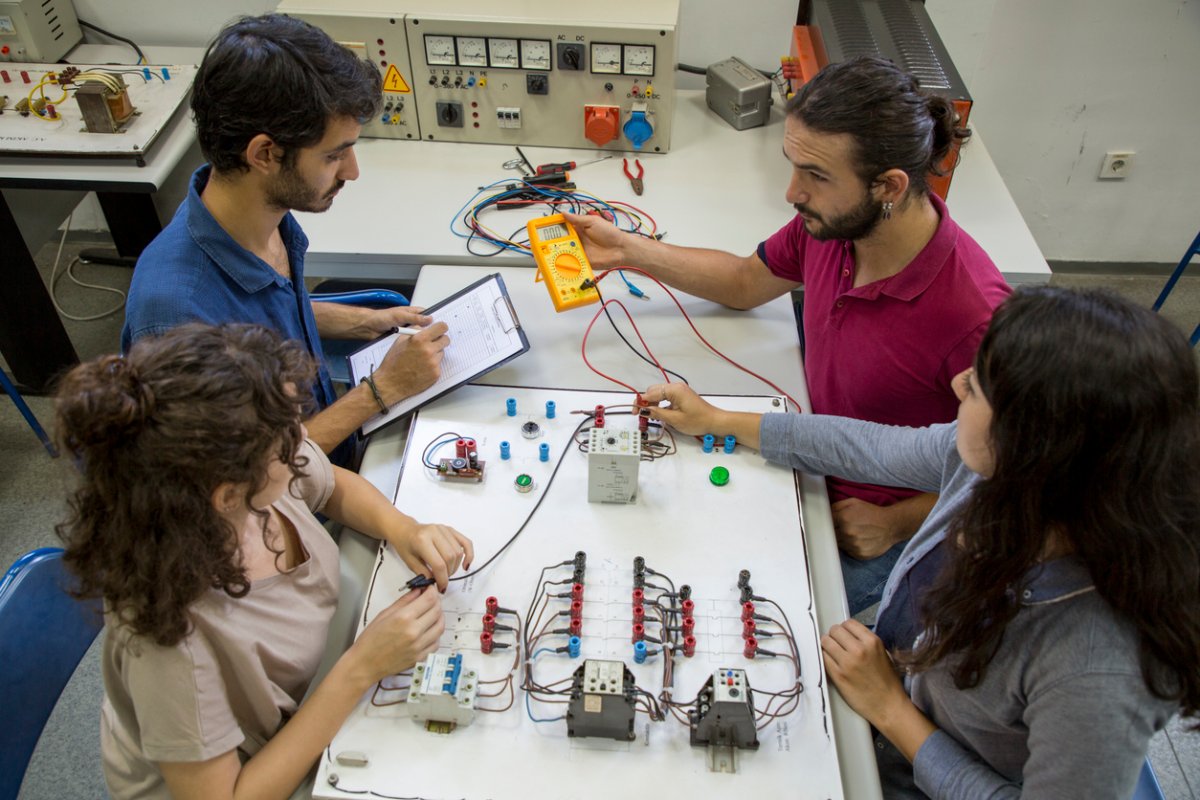We may earn revenue from the products available on this page and participate in affiliate programs. Learn More ›
Getting a license is an important step in an electrician’s career. However, it does take time and dedication to become a licensed electrician. These professionals work with potentially dangerous utilities, and local licensing boards need to ensure they’re up to the task. For that reason, there are certain steps an individual will need to take to obtain a license.
Despite the process of getting an electrician license being a long one, it is well worth it since a career in electrical work can be incredibly rewarding. During the process of learning how to get an electrician license, aspiring electricians can get a feel for whether a career in this trade is a good fit for them, and if so, make a plan to reach their goals.
Before You Begin…
Becoming an electrician takes time. Even if someone knows how to perform the majority of the electrical tasks around a home, it takes years of training to even be eligible to take a licensing exam. Electricians have to start at the bottom and work their way up, so they will need to be patient when pursuing this career.
Also, aspiring electricians will need to understand that there are different requirements for electricians and electrical contractors. It’s important that aspiring electricians understand the process of securing their electrician’s license and then becoming an electrical contractor so they know exactly what awaits them on their journey.
Tips for Getting an Electrician License
- Research licensing requirements. Aspiring electricians will want to understand the specific electrician licensing requirements in their state, since these requirements can vary significantly from one state to another.
- Prepare carefully for the licensing exam. If the electrician is required to take an exam in order to get a license, they’ll want to make sure they study well and prepare thoroughly so they don’t have to retake the exam and pay an additional fee.
- Understand business license requirements. If the electrician decides to start their own business, they’ll want to determine which licenses are required to legally run a business. They can typically find this information by contacting their secretary of state’s office.
Documents Required to Get an Electrician License
When applying for an electrician license, there are several important documents an individual must provide. These documents may include the following.
- Driver’s license
- High school diploma or GED
- Certificate of completion from an electrical training program (optional)
- Proof of completed apprenticeship program
STEP 1: Familiarize yourself with the electrician licensing requirements in your state.
The electrical license requirements are different from state to state. Before starting their journey from an apprentice applicant to a licensed electrician, individuals will want to become familiar with the licensing requirements in their state.
The following are the most important electrician license requirements in each of the 50 U.S. states. There could be additional requirements for specific jurisdictions (counties or cities). Also, there are different electrician license types, including apprentice, journeyman, and master. Each license has its own specific requirements for applicants to consider.
These requirements can serve as the minimum guidelines for getting a journeyman license in the U.S., which is typically what’s required to work without supervision and start a contracting business.
| State | Electrician License Requirements |
| Alabama | 8,000 hours of experience, and pass a licensing exam |
| Alaska | 8,000 hours of work experience (6,000 in commercial or industrial), and pass a licensing exam |
| Arizona | Varies depending on classification (no journeyman license) |
| Arkansas | 4 years of experience as an apprentice electrician or 16,000 hours of electrical construction experience, and pass a licensing exam |
| California | Varies depending on classification (no journeyman license) |
| Colorado | 4 years of experience, including at least 2 years of experience in commercial and/or industrial work, and pass a licensing exam |
| Connecticut | 4 years of experience or apprenticeship, and pass a licensing exam |
| Delaware | Complete of an apprenticeship program and show proof of general liability insurance |
| Florida | Governed by local municipalities |
| Georgia | Complete an apprenticeship program, and pass a licensing exam |
| Hawaii | 10,000 hours of industrial work and 240 hours of classroom training, and pass a licensing exam |
| Idaho | 8,000 hours of experience under a licensed journeyman or master electrician, and pass a licensing exam |
| Illinois | Governed by local municipalities |
| Indiana | Governed by local municipalities |
| Iowa | 4 years of experience and completion of an apprenticeship program, and pass a licensing exam |
| Kansas | At least 2 years of experience and 240 hours of classroom training, and pass a licensing exam |
| Kentucky | 4 years of electrical experience (notarized) and 570 hours of classroom training, and pass a licensing exam |
| Louisiana | Governed by local municipalities |
| Maine | 2,000 hours of experience, and pass a licensing exam |
| Maryland | Governed by local municipalities |
| Massachusetts | 8,000 hours of work experience, 600 hours of coursework, and pass a licensing exam |
| Michigan | 8,000 hours of work experience, and pass a licensing exam |
| Minnesota | 48 months of full-time electrical work experience, and pass a licensing exam |
| Mississippi | Governed by local municipalities |
| Missouri | Governed by local municipalities |
| Montana | 8,000 hours of work experience, and pass a licensing exam |
| Nebraska | 4 years of work experience with at least 8,000 hours of work OR 3 years of work experience and a two-year degree in electrical technology, and pass a licensing exam |
| Nevada | Governed by local municipalities |
| New Hampshire | 8,000 hours of work experience and 600 hours of electrical schooling, and pass a licensing exam |
| New Jersey | At least 5 years of work experience OR completion of a 4-year apprenticeship, and pass a licensing exam |
| New Mexico | Depends on classification: 2 or 4 years of electrical experience, and pass a licensing exam |
| New York | Governed by local municipalities |
| North Carolina | Governed by local municipalities |
| North Dakota | 8,000 hours of work experience OR 6,000 hours of work experience and 2 years of education at an approved electrical school |
| Ohio | Governed by local municipalities |
| Oklahoma | 4,000 hours of work experience, and pass a licensing exam |
| Oregon | 8,000 hours of work experience and 576 hours of classroom experience OR completion of an apprenticeship program OR 16,000 hours of experience in electrical work outside of Oregon |
| Pennsylvania | Governed by local municipalities |
| Rhode Island | 4 years of work experience and 576 hours of approved training, and pass a licensing exam |
| South Carolina | 2 years of electrical work experience OR completion of a 2-year associate degree program through a trade school |
| South Dakota | 8,000 hours of work experience as an apprentice, and pass a licensing exam |
| Tennessee | Governed by local municipalities |
| Texas | 8,000 hours of work experience, and pass a licensing exam |
| Utah | Completion of an apprenticeship program and at least 8,000 hours of training in 4 years OR at least 16,000 hours of training in 8 years, and pass a licensing exam |
| Vermont | 12,000 hours of experience, and pass a licensing exam |
| Virginia | 4 years of work experience and 240 hours of formal training OR 2 years of work experience and an associated 2-year degree, and pass a licensing exam |
| Washington | 8,000 hours of training on the job and 96 classroom hours, and pass a licensing exam |
| West Virginia | Completion of an apprenticeship program OR 8,000 hours of hands-on work experience, and pass a licensing exam |
| Wisconsin | 8,000 hours of experience, and pass a licensing exam |
| Wyoming | 8,000 hours of work experience and 576 hours of classroom instruction, and pass a licensing exam |

STEP 2: Complete the training requirements laid out by your state, either through trade school, an apprenticeship, or both.
Each state’s requirements for getting an electrician’s license vary. While this can seem confusing and frustrating, in some cases it means an applicant has several options for getting an electrician education.
According to Stephan Cole, corporate field trainer with Rosendin, a nationwide electrical contractor with headquarters in San Jose, California, “Obtaining an electrician license requires completing a set number of hours in an apprenticeship program in addition to passing the license exam. This will include time in a classroom as well as carrying a full-time job that shows progression of skills.”
Some states require an electrician to first complete a regimented apprenticeship program before they can apply for their license. There are two routes that an apprentice can go for their electrical apprentice license. The first is to apply for an apprenticeship with a private contractor and then register as an apprentice with the state. The other option is to apply for an apprenticeship through a local union and complete the union’s training program.
“It takes approximately 4 to 5 years to complete an electrical apprenticeship program,” says Cole. “These programs have documents called Standards of apprenticeship that layout the programs length and benefits. Most programs have wage and benefit periods that are based on progress with on-the-job training and related course completion. So, in other words, you will advance in wages and benefits throughout the time in the program.”
In other cases, a state might allow applicants to meet a certain number of on-the-job training hours or classroom instruction as a substitute for some of the work experience requirements. For example, an aspiring electrician may be able to decrease the amount of work experience they need by attending one of the best online electrician schools or trade schools. In some cases, applicants who performed electrical work in the military may even be able to substitute some of their time to meet electrician education requirements.
Some states don’t have any specific apprenticeship programs or requirements. Rather, these states require that the applicant work for a certain number of hours, months, or years under a licensed electrician or electrical contractor before applying for their license.

STEP 3: Schedule your testing date and study the National Electrical Code to make sure you’re prepared.
After aspiring electricians meet the baseline education and experience requirements, most states require electricians to take a trade exam. This exam tests a would-be electrician’s ability to recognize the different codes and techniques, understand how to use the best electrician tools, and demonstrate comprehension of other aspects of electrical work that they’ll need to employ to safely design and install basic electrical systems.
To find their local exam sites and electrician testing dates, an individual can head to their state, county, or city’s licensing board website. There they’ll find a list of potential dates and testing sites, as well as the requirements they need to meet to apply for their test. In most cases, the applicant will need to include a filing fee with their application.
In some cases, an aspiring electrician may need to submit an application before they get a list of exam dates. If their application is accepted, they’ll get a list of dates to choose from. States may offer several dates each month, while local municipalities may offer only a few testing dates each year.
After the applicant has scheduled their licensing exam, it’s time to start studying the National Electrical Code (NEC). The NEC is a guidebook produced by the National Fire Protection Association (NFPA). This guidebook has been generally accepted as the standard building codebook for most states; however, in some states (Arizona, Missouri, Illinois, and Mississippi), the NEC is only adopted on a local level.
STEP 4: Pass the exam and apply for your electrician license.
After scheduling the test and studying, it’s time for the applicant to put all their hard work and experience to the test. The following are good test-taking preparation tactics:
- Prioritizing sleep
- Eating brain-healthy foods, such as berries, citrus fruits, eggs, avocados, fish, and even dark chocolate
- Arriving at the test site early and prepared
- Listening to the instructions carefully
- Reading the entire test
- Skipping and coming back to test questions that the test-taker is not sure of
Once the exam date passes, the applicant will need to wait for their test results. They will come in the mail, and depending on the states or municipalities, this can take as little as a few weeks or as long as several months.
If the applicant passed their exam, they’ll be eligible to apply for their electrician’s license. The application will need to include a copy of the individual’s government-issued ID, their test results, and copies of any other documents required. The applicant can also expect to pay a licensing fee.
Once the applicant receives their license, they’ll be eligible to work as a licensed electrician. This comes with the potential to make more money and the ability to work with less supervision. The applicant is now officially an electrician journeyman, and they can apply for electrician’s positions or potentially start their own business.

STEP 5: Familiarize yourself with your state’s requirements for license renewal and continuing education to operate legally as an electrician.
Receiving an electrician license isn’t the end of the story. The individual will have some ongoing requirements to meet to continue working legally as an electrician.
The first requirement an electrician will need to meet is making sure they keep their license up to date, which may mean frequent renewals. Renewals come with a fee, which is typically reasonable, and they’re usually easy to file for. The electrician will simply need to head to their state’s licensing board’s website and check out the renewal requirements. While it’s important for an electrician to keep their license current, many boards will reinstate a lapsed license for a fee as long as the electrician takes care of the renewal within a specific time frame.
The other requirement an electrician may need to meet is in regard to continuing education. The licensing board sets these requirements as well, and electricians are often required to attend a specified number of hours of classroom instruction. Unions typically make this very easy for their members, but non-union electricians will have to find and attend their own continuing education classes to meet the ongoing licensing requirements. If an individual wants to get an electrician certification that allows them to take on more specialized work, they’ll typically need to take additional classes.
The reason an electrician needs to renew their license is because the NEC is updated every 3 years, which means new codes or changes may exist that electricians need to be aware of. Electrical technology is also advancing faster than ever, so ongoing education can help today’s electricians learn these new technologies.

STEP 6: Choose your business structure and get a business license if necessary.
Some electricians decide to work for larger electrical companies, while others decide to work for themselves. If an electrician decides to become an electrical contractor and start their own business, they’ll need to choose a business structure. There are several business structures to choose from, but the most popular choices are sole proprietorships, limited liability companies, and corporations.
- Sole proprietorships operate under the name of the owner, though they may want to get a “Doing Business As” or DBA license to give their business an official name. Sole proprietorships don’t come with a lot of paperwork requirements, but they also don’t provide much liability protection for the business owner. Therefore, if a client sues the business, the owner’s personal assets will be on the line.
- Limited liability companies (LLCs) are great for smaller electrical contractors, especially for those who work alone or in very small teams. These businesses separate the company’s assets from the owner’s personal assets, providing more liability protection. There is also a bit more flexibility in terms of taxes, so many sole proprietors eventually move to LLCs. Business owners can enlist the help of one of the best LLC services (such as LegalZoom or Northwest Registered Agent) to help them set up an LLC.
- Corporations offer increased protection against liability for shareholders, while an S corp specifically is better tailored to small businesses since it provides the same level of liability protection but also pass-through taxation benefits.
Once the business structure is nailed down, it’s time for the business owner to register with their state’s business agency. Some states handle this through the secretary of state, while others have business or labor agencies handle it.
It’s important for business owners to to note that they may also need a secondary license to start a contracting business. Some states require electrical contractors to carry an electrical contracting license. To apply for this type of license, electricians can typically head back to their state’s electrical licensing board. Also, some states require contractors to work under a master electrician license, which means a few more years of experience and another test.
One other type of business license that an electrician might be required to have in their state is a business license. These licenses are issued by the state, and state websites are typically the best sources to learn how to get a business license.

STEP 7: Get insurance coverage to protect you and your business from liability.
Regardless of how an electrician forms their business or what the state requires, they’ll need coverage from one of the best small-business insurance providers, such as NEXT or Thimble, to protect their business. Coverage will vary depending on the scope of the business, but an electrician will likely need general liability insurance, commercial vehicle insurance, and workers’ compensation insurance, and there are other types available to suit individual needs.
General liability insurance protects electrical businesses from a wide spectrum of issues that can occur. Essentially, this policy provides insurance against third-party claims for bodily injury or property damage. These situations are caused by accidents, such as a client tripping over tools the electrician leaves out and sustaining an injury, or a ladder falling onto a neighbor’s fence and causing property damage.
Many insurance companies will help electrical contractors by bundling several types of business insurance policies into one. For example, an electrical contractor might be able to combine their commercial vehicle insurance, general liability, product liability, inland marine (which protects tools and equipment), and any other policies into one payment, ensuring the contractor is protected on all fronts.
The process of getting an electrician license is a marathon rather than a sprint, but the end result is a rewarding and lucrative career that will be in demand indefinitely. Aspiring electricians will want to remember that licensing requirements differ from state to state, so it’s essential that they become familiar with the requirements where they live and work. Once an individual has their electrical license, they’ll become who their clients call for home repairs that involve electricity and can build long-lasting client relationships. They will want to put time and money toward marketing their business so they show up as a top option when a potential client searches online for “hire an electrician near me.” Licensed electricians will also want to be sure to stay up to date on their licensing and continuing education requirements, as well as to carry an insurance policy that will protect them, their business, and their customers.


